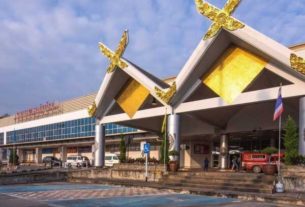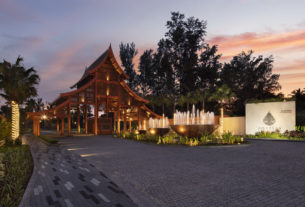The ambition of Laos to turn Vientiane into a city equivalent to Singapore or Bangkok justifies all construction activities in the Laotian capital. With Chinese money flooding into the country, such a move bears also the risk to alter the charm of the city and turn it into a replica of a Chinese suburb.
Since Laos opened up its economy 15 years ago, the country has been embarked into a modernization process, offering land concessions, financial incentives to whoever is interested to invest. And for the last decade, China has been increasingly visible all around the country with Vientiane being particularly wooed by Chinese investors. Experts see Vientiane being turned into China’s outpost within the ASEAN (Association of Southeast Asian Nations). The presence of China goes back to 2000 but this is only over the last three years that this Chinese presence has turned ubiquitous. Between 2009 and 2010, total trade between China and Laos increased by 44% just in a year time, growing from US$ 75.2 million to US$ 108.5 million.
Construction with signs of Chinese companies can be seen everywhere in the streets of the once-old fashioned, laid-back small capital. Vientiane had in the early years of 2000 ago some 600,000 inhabitants; twelve years later, population is in Vientiane is now estimated to reach 800,000 people. Authorities even believe that by 2030, this population will even double, the equivalent of over 1.5 million inhabitants.
The race to modernization has definitely started to turn Vientiane into a contemporary metropolis. Unfortunately, little seems to be learned from neighbours and Vientiane is inexorably condemned to look in a few years like any other large city in Southeast Asia.
They are projects everywhere to accommodate growth. From the old Morning Market in the city centre, just two half buildings remain squeezed between blocks of offices with the charm of a Soviet hospital. Around Wat Phou (Fountain Square), the heart of the old town, constructions are everywhere. The square but also surrounding buildings are now modernized.
The biggest project to date is “Glory of Laos”, a massive development stretching on 42 km2 of land along the Mekong with 700,000 square metre of development. “Glory of Laos” aims to turn Vientiane into a mini-replica of Hong Kong with 8 to 10 skyscapers lining along the Mekong –including the highest in the country at over 100 meters. The project integrates also a huge shopping mall as well as cultural and tourism centre. Some 50 villas will be also achieved before November to welcome the ASEM Summit between Europe and Asia. The real estate development project is consisting of the International Cultural and Tourist Centre as well as the International Residence Centre. The International Cultural and Tourist Center will be Laos’ first pedestrian zone with shops, bars, nightclubs and etc. and will stand next to the new shopping mall. The International Residence Centre will cater for expats living in the capital.
Behind the famed pagoda of That Luang, one thousand hectare of land has been attributed to a Chinese company to build a modern kind of Chinatown with blocks of apartments lining-up along vast streets. However, protests from locals forced the authorities to scale down the project. In Chanthaboury District, a new area is under development into a new urban centre under supervision of a Japanese company, Nikken Sekkei Civil Engineering Co. Ltd. Japan will however only conduct a survey and look at the most appropriate design for urban planning in this area.
The redesign exercise is part of a draft master plan from authorities to develop Vientiane until 2030. The plan is to make Vientiane an easier city to live in. Under the new development policy, Vientiane will be divided into zones to make it easier for the business sector. Zoning areas include Vientiane industrial park, Nong Ping Development Area and the international airport reservation zone. These areas will help preserving the structure of the old city centre. The master plan caps the height of buildings in historical town conservation zones to 12 metres while in the oldest parts of Vientiane, height will be capped at 7 metres. Despite this regulation, the destruction of many old houses go unabated. Latest victim to this destructive furry is a magnificent colonial villa, facing the National Library and Nam Phou, Fountain Square. It just made way to a hideous new construction, which will be a “boutique” shopping mall.
Source: http://traveldailynews.asia/news/article/49925/laotian-government-prepares-vientiane-to

